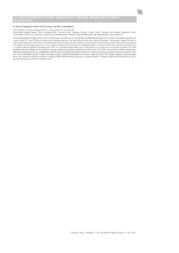Is classical biological control viable in large scale forest plantations?
Is classical biological control viable in large scale forest plantations?
Author(s): WILCKEN, C. F.; BARBOSA, L. R.; SA, L. A. N. de; ZANUNCIO, J. C.
Summary: The forest plantations (Eucalyptus, Pinus) have low biodiversity, increasing risks of pest outbreaks and difficulting biological control, mainly in Eucalyptus plantations due to short rotation (6-7 years). The last two decades had a substantial increase in the introduction of exotic pests, mainly to Eucalyptus. The strategy to manage these pests is only Classical Biological Control (CBC) wit the introduction of specific parasitoids from Australia. In Brazil, the use of Cleruchoides noackae x Thaumastocoris peregrinus in Eucalyptus and Xenostigmus bifasciatus x Cinara atlantica in Pinus had succesand that of Psyllaephagus bliteus x Glycaspis brimblecombei success and Anaphes nitens x Gonipterus platensis (parasitism decreasing since 2012 in SP and Parana States) partial success Selitrichodes neseri x Leptocybe invasa is under evaluation. The forest plantations have the advantages of receiving fewer spraying of chemical insecticides; maintenance of native forest in 25 to 30% of the total area in Brazil and understory, which promoting refuge areas; fast establishment of natural enemies in tropical and subtropical regions; few intense silvicultural procedures and better acceptance to CBC due to forest certifications systems. The main constraints are farmers without full information access on new exotic pests and to CBC programs; regulatory rules increasingly harder; slow parasitoid production in laboratory conditions; difficult field releasing in large areas; complicated logistic to shipping natural enemies in distant areas; lack of governmental programs and funds to implement them.
Publication year: 2019
Types of publication: Abstract in annals or event proceedings
Unit: Embrapa Environment
Keywords: Controle Biológico
Observation
Some of Embrapa's publications are published as ePub files. To read them, use or download one of the following free software options to your computer or mobile device. Android: Google Play Books; IOS: iBooks; Windows and Linux: Calibre.
Access other publications
Access the Agricultural Research Database (BDPA) to consult Embrapa's full library collection and records.
Visit Embrapa Bookstore to purchase books and other publications sold by Embrapa.

